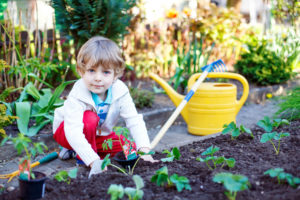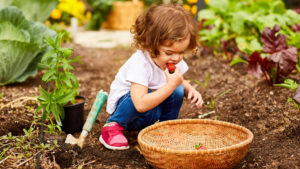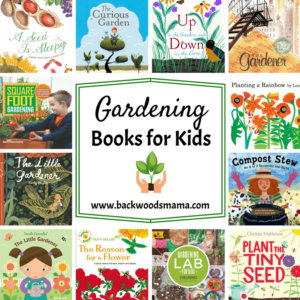How Gardening Benefits Children
While many families are at home together this Spring, this is the perfect time to start a garden or revamp one you may already have. Children are curious, like to learn by doing and love to play in the dirt. Working in a garden, a child can experience the satisfaction that comes from caring for something over time, while observing the cycle of life first hand.
Gardening gives children a chance to learn an important life skill, one that is often overlooked in standard school curriculums. Gardening is also a great way to teach environmental awareness by exploring the workings of nature.
Growing plants is a wonderous and magical thing and should be a part of every child’s upbringing. Gardening provides many important forms of engagement for children, including:
- Designing and laying out the garden
- Planting and maintaining the garden
- Harvesting, preparing and sharing food
- Working cooperatively in groups
- Learning about science and nutrition
- Increasing self-esteem through seeing the results of their work
- Creating art and stories inspired by gardens
- Gardening is good for building muscles, fine motor skills and coordination
Many studies have been conducted on how gardening benefits children. The following lifelong benefits have been found:
- Children who garden are more likely to show interest in gardening as they aged and to form positive relationships with gardens and trees
- Positive social and interpersonal skills and an increase in self-understanding and the ability to work together in groups
- Children who grow their own food are more likely to eat fresh fruits and vegetables.
- Children who have participated in school gardening activities scored significantly higher on science achievement tests
- Children who participated in a gardening program showed significantly more gains in pro-environmental attitudes
Growing vegetables with children can make both gardening and parenting more rewarding. Start with these easy-to-grow kid-pleasing vegetables to keep everyone happily involved in gardening. The easiest vegetables to grow are:
- Radishes
- Alfalfa and other sprouts
- Carrots
- Zucchini
- Beans
- Peas
- Lettuce
- Pumpkins
- Edible flowers
- Cucumbers
If you don’t have a yard to garden in, you can plant herbs, like basil, cilantro, peppermint, thyme and oregano in individual small pots or one larger herb pot. You will have fresh herbs to add to many of your favorite dishes. Have your children clip the leaves off and drop them into the pot as you are cooking.
Literacy skills can be part of gardening, too. Learning the names of the different plants and reading what their growth requirements are on the seed or plant packages is a literacy activity. Another reading and writing activity could be to make a map of your garden or yard and labeling the plants in it.
Cognitive development can be enhanced by asking open-ended questions about what you have already done in your garden and what they think you should do next. Show your children the entire plant – roots, stem, leaves, flowers and seeds, or let them draw the plant at different stages of growth.
Finally, and perhaps most importantly, working together on your garden with your children is togetherness time. You build bonds with your children and create memories from your experiences in the garden. While your children are learning a lifelong love of growing things, you are also learning more about your children – how they think, what they like and dislike and how capable they really are.
Below is a link to some wonderful gardening books for children.

- A Seed Is Sleepy
by Dianna Hutts Aston and Sylvia Long
- Berries, Nuts, And Seeds by
- Compost Stew: An A to Z Recipe for the Earth
by Mary McKenna Siddals and Ashley Wolff
- Gardening Lab for Kids: 52 Fun Experiments to Learn, Grow, Harvest, Make, Play, and Enjoy Your Garden by Renata Fossen Brown
- Gardening Projects for Kids
by Jenny Hendy
- I Can Grow a Flower
by DK
- Miss Rumphius
by Barbara Cooney
- Oh Say Can You Seed?: All About Flowering Plants by Bonnie Worth and Aristides Ruiz
- Plant the Tiny Seed
by Christie Matheson
- Planting a Rainbow
by Lois Ehlert
- Square Foot Gardening with Kids by Mel Bartholomew
- The Book of Gardening Projects for Kids: 101 Ways to Get Kids Outside, Dirty, and Having Fun
by Whitney Cohen and John Fisher
- The Curious Garden
by Peter Brown
- The Gardener
by Sarah Stewart
- The Little Gardener by Jan Gerardi
- The Little Gardener
by
- The Reason for a Flower: A Book About Flowers, Pollen, and Seeds (Explore!)
by Ruth Heller
- Up in the Garden and Down in the Dirt
by Kate Messner and Christopher Silas Neal
- We Are the Gardeners by Joanna Gaines and Julianna Swaney
- Yucky Worms by Vivian French